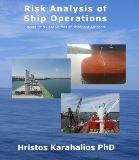Double Banking Operation
Sometimes ships are required to do double banking operations. By the term banking, we describe operations where a ship is discharging, loading, or bunkering from another ship or barge. Usually, it takes place at anchorage or congested berths. This is common in congested ports or where draft restrictions apply. In the second case, the laden ship discharges some cargo at anchorage before berthing. There may also be instances where two vessels double bank at a berth for the purpose of a ship-to-ship transfer. The North P&I Club and TANKEROperator have published some valuable guidelines.
In this article, we present which hazards a risk analysis should include when a ship's operator and master are planning such an operation at anchorage.
Lack of crew training
- Training and familiarisation of the ship’s crew with all the details of the operation taken.
Breach of ship Security
- Declaration of Security (DOS)
- Specific Security Assessment has got the details below:
- Security communications
- Action in event of a breach in security
- Local regulations regarding exclusion zones
- Current security level enforced by the port
- Security on various vessels (e.g. Barges)
- Dangers associated with accommodation doors
- Actions on the presence of unauthorised craft alongside
Unfavourable weather conditions
- Monitoring forecasting to the prevailing environmental conditions (visibility, wind and waves)
- If applicable, attention is given to operations in cold weather and/or ice conditions
- Training is delivered for rolling and pitching movements.
- Plan actions if an electrical storm is expected
Fire during cargo operations
- Smoking and use of naked lights is prohibited
- Readiness of fire-fighting equipment
- Precautions against the use of radio and satellite communication equipment addressed
Electrical Ηazards
- Risks associated with earths on electrical switchboards identified by the ship’s electrician.
- Electrical isolation between the two ships is discussed
Contingency Planning
- Training for helicopter medical evacuation operations
- Self-contained breathing apparatus and lifeboats and life-rafts ready for emergency evacuation
- SOPEP equipment made available in case of an oil spill
- Familiarise with procedures for reporting oil spill as per SOPEP
Change of Command Failure
- Master stands at all times liable for the safety of the ship, its crew, cargo and equipment
- Only master approves any machinery operations about main engines, emergency power, steering gear, boilers, fuel changeover
Cargo Spillage
- IMDG Code sections are studied in event of cargo leakage on either vessel
- Material safety data sheets (MSDS) for the products being available onboard
Ship Drag, Collision
- Radar usage discussed with navigation officers
- Monitor broadcast of navigational warnings
- Complete a specific passage plan if the operation is to be conducted en route
- Preparation of ship before manoeuvring
- References of various navigational signals to be used
Health Hazards
- Personal protective equipment is provided for the cargoes handled
Communication Failures
- Shipboard general communications established
- A common language for communication is established (internal and foreman)
- Ensure that any information requested from the ship are presented by the agent
- Addresses communications during arrival, departure, mooring and unmooring
- Establish procedures in place for communication failure
Mooring/unmooring operations failure
- Risk Assessment for mooring operations at sea addressed
- The ability of the ship’s mooring system has been examined for the following:
- Danger of excessive tension in mooring lines between the vessels
- Mooring line lead angles
- Awareness of weather thresholds
- Cautions against long-period waves
- Directions of wave encounter
- Elasticity of mooring arrangement
- Chafing protection
Coating damage of the ship’s hull
- Fenders to be used and rigged
- Condition of fenders is verified by crew

